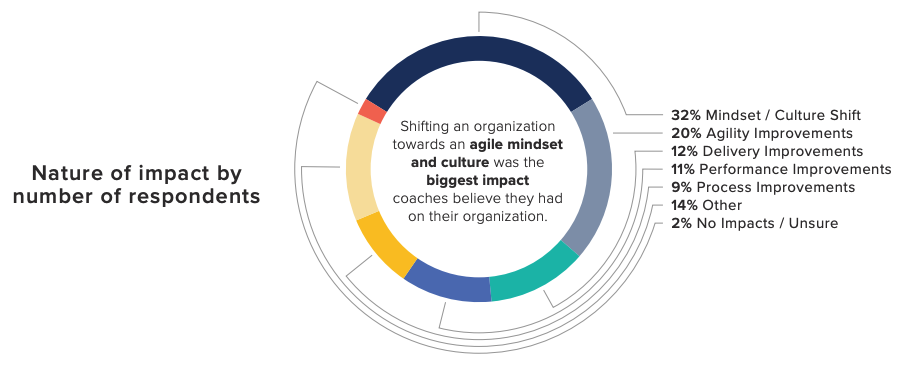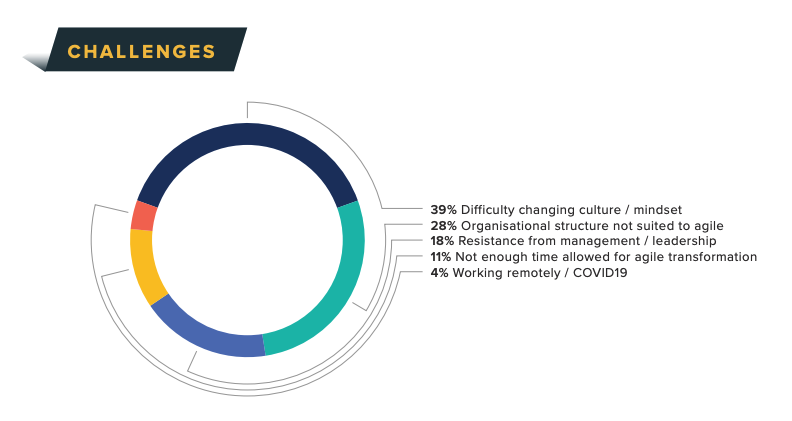Learn about purchasing for teams
You Might Know Agile, But Do You Know How to Coach?

Agile coaching is a noble calling. We choose to help teams, organizations, and leaders towards higher levels of effectiveness. Yet we face unfair criticism, demands for instant results, and stress and exhaustion from being stretched too thin... all so that we create a better working environment for the people we serve.
That is why it is so concerning that the root cause of our reported #1 struggle is self-inflicted.
Hot off the press, the 2022 State of Agile Coaching Report validates some key points the industry has already known for well over a decade. Some insights are encouraging, and some are disturbing.
Our Positive Impact

First, let’s start with the good news.
Practically every agile coach (98%) reports having a positive impact on their organizations. Moreover, the most common impact we find ourselves having is helping to shift mindsets and culture. That’s important, because shifting mindset and culture was also cited as the #1 challenge organizations face in achieving agility. Our biggest impact relates to our client’s biggest hurdle; that’s something to celebrate.
But that’s also where the story starts to turn.
Our Greatest Challenges

Much of the report highlights the severity of the challenges that agile coaches struggle with. It features several quotes of coaches who lament things like…
- “Legacy mindset and behaviors are still being rewarded and tolerated.”
- “Too many generals. Too many north stars.”
- “Executives tell us to ‘be agile’ but don’t adjust their expectations accordingly.”
- “Not willing to accept change, enforcing old ways on teams.”
On the one hand, these quotes describe very universal problems in today’s organizations. They are indeed difficult impediments that we all see again and again.
On the other hand, one could ask a more pointed question: Isn’t it our very job to confront these challenges? Coaching is about helping people get better, so we should expect these things, right? Aren’t we the ones trained to deal with these obstacles to change?
It turns out, the report reveals we aren’t the coaches we need to be.
Our Measurable Skills Gap
Disturbingly, the data reveals most coaches are simply not trained to deal with these challenges. Of the more than 2,000 agile coaches surveyed across the world, only 19% have any accredited learning or independent recognition in the craft of professional coaching itself.
Which isn’t to say we aren’t trained at all. In fact, we are all very knowledgeable and trained in the agile mechanics our clients want, with nearly half of us (47%) boasting at least four (yes four!) certifications. Unfortunately, only a fraction of all our training relates to guiding people through the psychology of the change itself.
Our Collective Blindspot
Even more disturbing than the gap is the disconnect around growth goals.
When asked about our professional growth goals, only half of us (50%) admitted to needing more professional coaching skills. Instead, we generally prefer to learn more of the same stuff like organizational mechanics (50%), agile frameworks (36%), or product management (24%).
This is the definition of a blind spot: More than four in five agile coaches lack formal coach training, but only half of us seem to know or care about that gap.
Our Missed Impact
So, what’s the big deal? You may ask. Isn’t the primary value of any coach their expertise in a given field? Fair question. Here’s why this matters.
The International Coaching Federation defines coaching as “partnering with clients in a thought-provoking and creative process that inspires them to maximize their personal and professional potential.”
So, if you’re a world-class expert in products or teamwork or leadership, but you can’t get your clients to embrace any of your advice, why bother?
Here’s a test. When was the last time you had a colleague or client say something like the following?
- This is the first time we have agreed on anything as a team. You have some special powers.
- Thank you for the conversation last week. I’ve already started speaking truth to power much more confidently.
- No one has ever spoken to me this way before. It’s refreshing to have someone hold the mirror for me.
This is the job. If you’re not seeing progress on the greatest professional challenges your clients are facing, then you have a coaching skills gap.
The deeper your coaching skills, the deeper it changes your perspective as a changemaker, the deeper the impact we have.
The report confirms this. Coaches who claimed one or more master-level certifications no longer viewed culture and mindset as their primary challenge. Instead, they were able to shift their focus to the “greater challenges in the suitability of the existing organizational structure for agility.”
Our Pathway Forward
While our blindspot is significant, there is a bright side: it’s also very easy to fix. Ready to bridge the gap and start focusing on your coaching skills? Here are three steps to take.
- Get Mentored - Every coach also needs their own coach. Find one of the “Master” coaches the report describes, and get candid about your goal to get stronger. Be flexible with who helps you and how they help in the short term versus long term.
- Get Trained - There are countless ways to learn about coaching. That mentor can recommend several options ranging from formal university programs, to expensive certifications, to free self-paced learning (e.g. Scrum Alliance Path to Coaching).
- Get Feedback - Ask your clients how motivated they are about change. Ask how pleased they are with their progress. Ask whether your explanations, advice, or questions are helpful. This will inform which training to explore, and give you stuff to work on with your mentor.
To summarize, the latest data confirms the stereotype that agile coaches are “strong in agile, weak in coaching.” However, now that we know this gap actually matters, we are left with an encouraging truth: of all the flaws to have as a community, this one is at least very straightforward to address. We just have to be willing to coach ourselves through our own personal transformation to the next level.
Sign up below to download the 2022 State of Agile Coaching Report.










